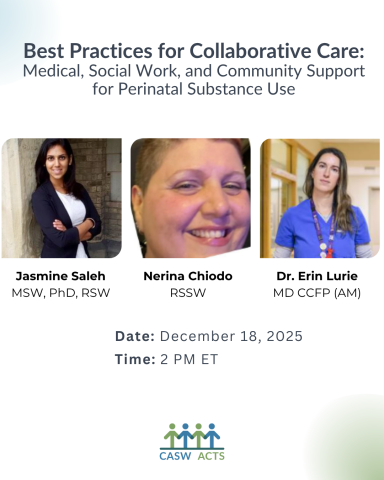
Jasmine Saleh, MSW, RSW
Jasmine Saleh is a Registered Social Worker with experience working in both the community mental health and hospital sectors. She is passionate about addressing barriers in health equity at an individual and systemic level, and works to foster flexible, inclusive, and trauma-informed approaches in her practice. Jasmine has worked with individuals who face significant barriers in accessing equitable care and are impacted by issues such as homelessness, poverty, discrimination, mental health, and substance use. Currently, Jasmine works at St. Michael’s Hospital in the My Baby & Me perinatal and addictions clinic as the clinic Social Worker, where she provides direct support to individuals through advocacy, crisis support, and resource navigation. Jasmine is also involved with program development and evaluation. She hopes to see the clinic’s capacity and outreach expand to continue helping this highly vulnerable community to access essential healthcare in safe and supportive environments.
Nerina Chiodo, RSSW
Nerina Chiodo is the Assistant Manager of the Early Intervention Program at Mothercraft, Breaking the Cycle, with a focus on the Pregnancy Outreach Program. Her clinical experience spans over 24 years, in the areas of street outreach, perinatal and addictions counselling, and early intervention and prevention for pregnant people living in conditions of high risk. She provides training on effective approaches for engaging and working with pregnant, unhoused, substance-involved people in the perinatal period, as well as interventions to support pregnancies affected by prenatal exposures to alcohol and drugs. Nerina has also presented on topics related to harm reduction in the perinatal and parenting periods, and on early intervention in the perinatal period.
Dr. Erin Lurie, MD CCFP (AM)
Dr Erin Lurie is a family physician in Toronto with subspeciality training in working with pregnant patients with active or historical substance use. She is the clinical lead for the perinatal and post-partum My Baby and Me program at St Michael’s Hospital in Toronto. She has a strong interest in harm reduction and education, serving as the Program Director for the University of Toronto’s Fellowship in Addictions Medicine.
